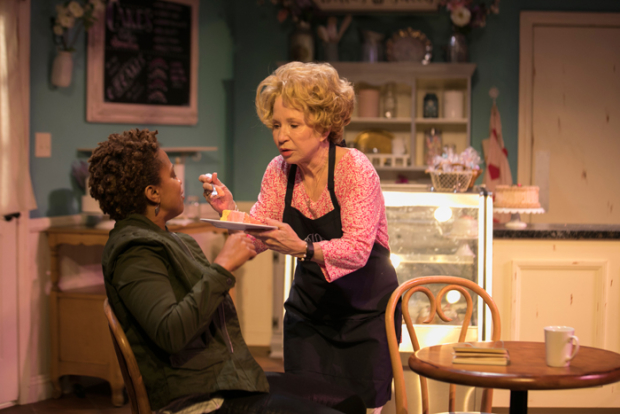The Cake Is Ripped From the Headlines and Fresh From the Oven
Bekah Brunstetter’s comedy personalizes a newly relevant tale.

(© Chris Whitaker)
In this political climate, it is very easy to demonize those who think differently, particularly when their beliefs infringe on others' rights. The right to refuse service to members of the LGBTQ community has become explosive, going all the way to the Supreme Court, where the issue has still not been resolved. The Cake, a remounting at Geffen Playhouse of the 2017 production by the Echo Theater Company, digs into this conflict. In whittling it down to human connections, it welcomes audiences to see Della, the baker in the story, as a real person, even if they disagree with the religious convictions that prevent her from baking a cake for a lesbian couple.
Jen (Shannon Lucio) returns to her North Carolina home to plan her wedding to New York journalist Macy (Carolyn Ratteray). Her mother has passed away and she wants, more than anything, to feature a cake from her mom's best friend, Della (Debra Jo Rupp), so that a part of her mom will be in attendance. While Della has always adored Jen, she also believes that by making a cake for the wedding, she would be endorsing homosexuality, which she believes is a sin. This rift devastates Jen and puts a strain on her relationship with Macy. Della has her own marital issues with her husband, Tim (Rod McLachlan), who hasn't made love to her in years. Della battles her personal and professional demons and attempts to figure out what a good Christian woman should do.
By adding a preexisting loving relationship between the baker and the bride, The Cake layers the pathos. Brunstetter builds relatable characters whose pasts inform their present decisions so that audiences can comprehend why the characters react in their manner.
The script explores Della's unease over the situation and the decision she makes. Audiences can still disagree or be angry with Della's choice, but it does not come off as a flip response. It breaks her heart. Brunstetter also offers us glimpses inside Della's mind with the device of a fantasy episode of The Great American Baking Show, on which Della appears as a contestant. Throughout the play, Della speaks to an imaginary announcer, but in her mind, the announcer judges her moral choices, acting as a devilish Jiminy Cricket.
Rupp is extraordinary as the harried woman trapped by her moral upbringing. A frenzied, fast talker, her mind is always racing, and the audience can sense the peace she finds when she bakes. Rupp's performance is unbound, without any sense of ego. She allows the audience to hate her when necessary, pity her, and eventually embrace her. Lucio vividly conveys the frustration of a woman who always felt out of sync with the world around her. That her relationship with Macy has been condemned by those she trusts and loves only destroys her more. Macy's dialogue contains much of the play's message, but Ratteray allows Macy's contradictions and insecurities to humanize her so that she comes off as not just a soapbox character.
Director Jennifer Chambers keeps the humor flowing so the audience never feels the play is too preachy. Scenic designer Pete Hickok's playful three-compartment set includes sumptuous colors for the bakery, the look of a Laura Ashley showroom for Della's bedroom, and a boy's room with an aviator theme for the room Jen and Macy share at her cousin's house. All three sets remain onstage the entire time, and none are too busy to distract audiences when two remain dormant. Lighting designer Pablo Santiago uses pastel neon lights to separate the real world from Della's fantasy time on The Great American Baking Show. The amusement-park feel turns the show in Della's mind into a funhouse reflection of her anxiety. Elizabeth Caitlin Ward's costumes include a beautiful, understated wedding dress and a sassy tailored tuxedo.
Homosexual marriage seemed like a pipe dream only 15 years ago. Now it is the law of the land. While the rest of America moves in a progressive direction, plays like The Cake map out why there are people who still fear the union of two people who love each other. Only by understanding both sides can the divide shrink. After all, a wedding cake isn't baked in a day.








